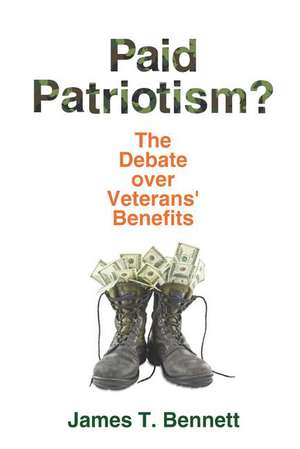Paid Patriotism?: The Debate over Veterans' Benefits
Autor James T. Bennetten Limba Engleză Paperback – 14 apr 2017
These questions have been answered in varying ways by the American people and their elected representatives since the Revolutionary War. Paid Patriotism? explores the genesis and growth of soldiers’ pensions throughout the nineteenth century, the Bonus experiment after the First World War, the passage and consequences of the GI Bill of Rights, the growth of the nation’s system of veterans’ hospitals, the evolution of veterans’ programs during the Cold War and Vietnam, the post-9/11 GI Bill, and contemporary scandals and reform efforts within the veterans’ bureaucracy, from its promotion to a cabinet department to wrongdoing in the Veterans Health Administration.
James T. Bennett examines the complex and politically charged history and heated present-day debate of what the late columnist William Safire called the “most sacred cow” in Washington: the veterans’ bureaucracy. In the end, the United States and its citizens owe veterans a debt. But how has and how should that debt be honored—and at what cost?
| Toate formatele și edițiile | Preț | Express |
|---|---|---|
| Paperback (1) | 367.83 lei 6-8 săpt. | |
| Taylor & Francis – 14 apr 2017 | 367.83 lei 6-8 săpt. | |
| Hardback (1) | 1002.63 lei 6-8 săpt. | |
| Taylor & Francis – 14 apr 2017 | 1002.63 lei 6-8 săpt. |
Preț: 367.83 lei
Nou
Puncte Express: 552
Preț estimativ în valută:
70.38€ • 73.75$ • 58.18£
70.38€ • 73.75$ • 58.18£
Carte tipărită la comandă
Livrare economică 12-26 aprilie
Preluare comenzi: 021 569.72.76
Specificații
ISBN-13: 9781412865494
ISBN-10: 1412865492
Pagini: 290
Dimensiuni: 152 x 229 mm
Greutate: 0.41 kg
Ediția:1
Editura: Taylor & Francis
Colecția Routledge
Locul publicării:Oxford, United Kingdom
ISBN-10: 1412865492
Pagini: 290
Dimensiuni: 152 x 229 mm
Greutate: 0.41 kg
Ediția:1
Editura: Taylor & Francis
Colecția Routledge
Locul publicării:Oxford, United Kingdom
Cuprins
Acknowledgments
Introduction
1 Decrepit Old Men Asking Only for Their Due: The Origins of the Veterans Lobby
2 Shark-Infested Waters: The Scramble for Pensions after the Civil War
3 The War to End All Wars Does Not End All Wars but Does Give Birth to the Boners and Revives the Veterans of Foreign Wars
4 The 1944 GI Bill: Hype Exemplified
5 An Endless Parade of GI Bills? Korea, Vietnam, and Post-9/11
6 The Best Medicine? The Growth of the Veterans Medical Complex and a Culture of Entitlement
Index
Introduction
1 Decrepit Old Men Asking Only for Their Due: The Origins of the Veterans Lobby
2 Shark-Infested Waters: The Scramble for Pensions after the Civil War
3 The War to End All Wars Does Not End All Wars but Does Give Birth to the Boners and Revives the Veterans of Foreign Wars
4 The 1944 GI Bill: Hype Exemplified
5 An Endless Parade of GI Bills? Korea, Vietnam, and Post-9/11
6 The Best Medicine? The Growth of the Veterans Medical Complex and a Culture of Entitlement
Index
Recenzii
"In Paid Patriotism, George Mason University economics professor James Bennett takes a long, highly critical look at the history of verterans' benefits...It's an overwhelmingly sordid tale, but one that the author tells with enthusiasm." — George Leef, Regulation
“Few would argue against the fairness of providing post-service benefits to military veterans in the form of pensions, health care, and education funding, especially for veterans who were injured in battle, or conscripted into the military. In Paid Patriotism? James Bennett shows that these programs, initiated to support those who sacrificed for their country, become transformed by politics into raids on the Treasury. Bennett provides a readable and compelling story, supported by lots of facts, to demonstrate the pernicious effects politics has had on veterans programs.” —Randall G. Holcombe, DeVoe Moore Professor of Economics, Florida State University
“James Bennett’s cogently written and insightful Paid Patriotism? illustrates the perversity of political incentives: benefits awarded to deserving veterans are invariably subjected to relentless political pressure to reduce reasonable distinctions between the deserving and the less deserving and to increase the number and generosity of these programs. This book’s comprehensive assessment of veterans’ programs will make a major contribution to the coming debate about what the nation owes its veterans.” —Dwight R. Lee, Senior Fellow, William J. O’Neil Center for Global Markets and Freedom, Southern Methodist University, Cox School of Business
“Few would argue against the fairness of providing post-service benefits to military veterans in the form of pensions, health care, and education funding, especially for veterans who were injured in battle, or conscripted into the military. In Paid Patriotism? James Bennett shows that these programs, initiated to support those who sacrificed for their country, become transformed by politics into raids on the Treasury. Bennett provides a readable and compelling story, supported by lots of facts, to demonstrate the pernicious effects politics has had on veterans programs.” —Randall G. Holcombe, DeVoe Moore Professor of Economics, Florida State University
“James Bennett’s cogently written and insightful Paid Patriotism? illustrates the perversity of political incentives: benefits awarded to deserving veterans are invariably subjected to relentless political pressure to reduce reasonable distinctions between the deserving and the less deserving and to increase the number and generosity of these programs. This book’s comprehensive assessment of veterans’ programs will make a major contribution to the coming debate about what the nation owes its veterans.” —Dwight R. Lee, Senior Fellow, William J. O’Neil Center for Global Markets and Freedom, Southern Methodist University, Cox School of Business
Descriere
What does a nation owe its military veterans? Gratitude, esteem, land grants, medical care, pensions, higher education? Or is serving in the armed forces of one’s country an obligation to be undertaken without any expectation of compensation? If veterans are to receive government aid, should a distinction be made between those who served in wartime or faced enemy fire and those who saw neither war nor combat?
